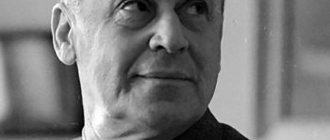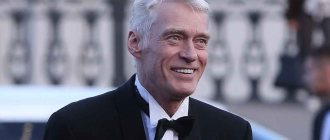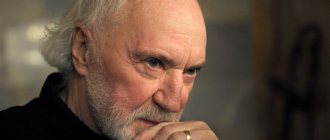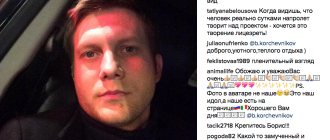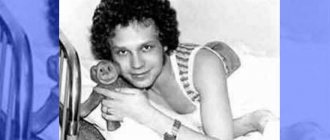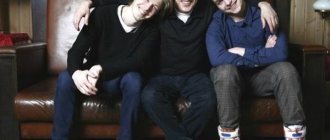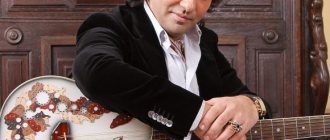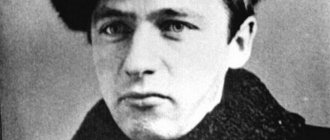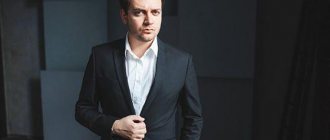Boris Titov
Boris Yuryevich Titov was born into the family of an employee of the USSR Ministry of Foreign Trade, so his childhood was different from the childhood of other Soviet children. So, when Bora was six years old, his family followed the head on a business trip to New Zealand. The boy went to a New Zealand school, where he studied with the grandson of the first secretary of the local Communist Party, as well as with the grandson of the richest man in New Zealand.
The foreign fairy tale ended four years later, when I had to return to my homeland. Here they didn’t even want to admit Boris to school, since during the years he spent on the island, he managed to get out of the habit of speaking Russian. As a result, Boris Titov went to school, and not to a regular school, but to a special English one. For a long time he studied with “C” grades, and only towards the end of school did he come to his senses. Through connections, the father found a way to MGIMO, and it was then that his son began studying science with a teacher from this institute, naturally for a fee.
After graduating from school, Boris Titov managed to enroll in the then prestigious specialty of international economist. At the institute, the young man loved to discuss with teachers, but at the same time he never crossed the line, but on the contrary, he knew how to gain confidence, so much so that he passed exams ahead of schedule. Classmates called Boris Titov an opportunist, although he himself later claimed that his nickname was “dissident.”
The fact that Boris Titov was not a dissident is evidenced by the fact that in his third year he received an interesting offer from the KGB, which, however, did not lead to anything. But sometimes Boris Titov really went against the system, however, he did this, guided not by ideological, but by commercial motives. So the student sold records of foreign performers to his classmates, which his parents brought from business trips abroad.
Bread place
It was not only illegal ways of earning money that attracted Titov. He showed a good level of foreign languages and received offers to work as a Spanish translator. After graduation, there were even business trips to Peru. All this became possible thanks to another of my father’s acquaintances. By the way, this acquaintance had a pretty daughter, with whom Boris struck up a close friendship. The girl's name was Elena, and soon she became Titov's wife.
The father-in-law hastened to place the new family member, who had just received a higher education, in a new place of bread. He was on friendly terms with the head of Soyuznefteexport, where Titov ended up as a specialist in the supply of technical oils, oil and petrochemical products to Latin America and the Far East.
Boris Yuryevich Titov quickly found a way to make an already profitable job bring in even more money. Thanks to frequent business trips, Boris Titov had access to foreign goods. Flying to Cuba via Ireland, he purchased electronic watches from a European country for all his business trips. At the same time, the goods cost him 60 kopecks per unit, but in the Union he sold them for 60 rubles per unit.
So Boris Yuryevich Titov worked for about six years, until in 1989 he received a new offer from the Soviet-Dutch enterprise Urals. Here Titov took the post of head of the chemistry department. It can be noted that one of the co-owners of this enterprise was the future owner of the oil trader Gunvor, Gennady Timchenko.
Executive Director Titov
While still working at Soyuznefteexport and then at Urals, Titov collaborated with the London company, and in 1991 he himself became the executive director of this company. In the same year, he, together with several comrades, bought it. Here he again took up the post of executive director and also became chairman of the group. Over time, the company turned into an investment and trading group operating in the market of petroleum products, agro- and petrochemicals, as well as liquefied gases.
Boris Titov
Boris Titov's business developed actively. In 1992, his company built a chemical terminal in the port of Ventspils, and also purchased a terminal for transshipment of ammonia and petrochemicals from Latvia. In 1994, the Kavkaz port was acquired. Over time, the consolidated sales volume of the Solvalub group amounted to 700 - 800 million dollars, while the group bought up the assets of oil and agrochemical enterprises. Boris Yuryevich himself even got a private jet.
In 1996, Titov was elected president. And in 1999, he became chairman of the joint board of Interkhimprom OJSC, a company that managed Solvalub assets in Russia. Over the years, the company has increasingly acquired large projects. Among them were the supply of triple fabrics to automobile factories, and transshipment terminals for petrochemical products, and the production of fluoropolymers for the production of Teflon, and even a poultry farm.
Starting a career and creating your own business
After graduating from the institute, Boris Yuryevich gets a job at the Soyuznefteexport , but already in 1989 he leaves it to become the head of the chemical department at the international corporation Urals. Knowledge helped him, after 2 years, to found his own enterprise, Solvalub, which was engaged in prefinancing exports from Russia. Since 1992, the company has been building a chemical terminal and purchasing a building for transshipment of petrochemicals and ammonia from the Latvian OJSC Ventammoniaks.
Things are going so well that in 1999 the financial and industrial group Interkhimprom , in which Boris Titov is listed as the chairman of the joint board and asset manager of Solvalub in the Russian Federation.
In the period from 2001-2002, Boris Yuryevich was the president of the closed joint-stock company Azot, which was a joint venture of Gazprom and Interkhimprom, and also simultaneously owned stakes in enterprises that produced mineral fertilizers.
At the end of 2006, Titov’s company acquired about 60% of the shares in order to develop the famous champagne brand in Russia. 4 years later, Boris Yuryevich also concludes a deal to purchase Chateau d`Avize from Moët & Chando, the amount of which was not disclosed, but experts estimated the cost of the acquisition at 10 million euros.
Since 2012, Boris Titov relinquishes his duties as the general director of Abrau-Durso and completely enters the public service.
Business of Boris Titov
Over the years, Boris Yuryevich established business ties with many representatives of the oligarchy, as well as the economic bloc of the government. But some acquaintances with big people were still laid during his student years, since the university and faculty in which Boris Titov received his knowledge was what is called “thieves”. One of these acquaintances was Vladimir Potanin. It was he who pushed the businessman to social activities.
The thing is that in the early 2000s, representatives of big business, especially members of the so-called “seven bankers,” felt the threat of being pushed away from the levers of power. It was then that the idea arose to create the Russian Union of Industrialists and Entrepreneurs (RSPP), which was formally designed to protect the interests of business, but in fact united the ranks of the oligarchs. It was then that Potanin lobbied for the candidacy of Boris Titov in the management bureau of this structure, who also became its vice president. Obviously, the person of Boris Yuryevich Titov was chosen due to the fact that he was the least odious figure, not covered up by the high-profile frauds of the 1990s.
Vladimir Potanin
From that moment on, the businessman began to actively engage in social work, albeit for the benefit of the same business. In 2002, Titov headed the ethics commission of the Russian Union of Industrialists and Entrepreneurs. In the same year, he became president of the Mineral Fertilizer Industry Development Fund. It must be said that he received this post due to the fact that at that time he was the president of the largest company in the field of mineral fertilizers - CJSC Agrochemical Corporation Azot. This company was then owned by Solvalub together with Gazprom. In 2003, the RSPP and Gazprom created the non-profit partnership “Gas Market Coordinator”, of which Boris Titov also became the chairman.
Boris Titov: the path to the top of Prokhorov’s heir, Surkov’s protégé
Home / Society
4.03.2016
The new leader of the “Right Cause” comes from the highest Soviet nomenklatura, which was allowed a lot
“Boris Yuryevich, there is nothing personal against you - just the thoughts of a commoner after reading your elite biography,” the famous economist Nikita Krichevsky writes in his blog and breaks down the path to wealth and happiness of the new leader of the new right party of Russia, Boris Titov. This path turned out to be very smooth and was strewn with roses thrown by caring relatives. With such a leader, won’t “Just Cause” face another sad end?
IS IT NEEDED TO CLEAR THAT IN SOVIET TIMES THIS WAS A FAIRY TALE
In the last 24 hours there has been one newsmaker in Russia. This is Boris Titov , the new-old leader of the “Right Cause” (or whatever this spoiler party is now called).
I have no personal complaints against our hero, nor, by the way, against the one-party “naked king” Dmitry Potapenko. Unlike, however, Oksana Dmitrieva, whose rotten role in my failure to enter the State Duma was more or less revealed in the publication of MK in the fall of 2012.
That's not what this conversation is about. By chance, I became familiar with Titov’s biography posted on Wiki. The first thing that caught my eye was the higher education received not in some charade, but in MGIMO itself! For us, young Muscovites of the 1970s and 1980s, MGIMO was something transcendental, a haven for “golden youth”, where entry to mere mortals was strictly prohibited. Then, by the way, MGIMO was called MIMO (with the emphasis on the first syllable), which fully characterized the prospects for admission to this university. It was absolutely impossible to break through there, and individual exceptions only confirmed this simple truth.
I don’t know who Titov’s nomenklatura parents were, but working as a translator from Spanish during his studies, and even in Peru (!) - for a simple Soviet guy this was something out of fantasy (don’t you want to say that in the USSR were there no Spanish experts to be found? Although, as they write, Titov had "a respected family with almost unlimited connections. His grandfather headed a Moscow hospital for old Bolsheviks. His father was a famous geologist, a deputy of the Moscow Council. His father-in-law helped the newly arrived specialist get a good job. He was on friendly terms with Vladimir Morozov, at that time the director of Soyuznefteexport). Just like post-graduate work at Soyuznefteexport with a specialization in Latin America and the Far East (this is by no means Vladivostok and Khabarovsk, to which exports, of course, did not apply).
By the way, as they write, “the first years of work at Soyuznefteexport forced him to frequently travel on business trips. Trips to Cuba provided an additional opportunity to earn money. During a layover in Ireland, the young specialist purchased electronic watches for all business trips. Having spent one dollar apiece (a dollar was then equal to 60 kopecks), he sold them in Moscow for sixty rubles." And while studying at MGIMO, Titov made a fortune with imported gramophone records. Those in the know know what a shortage there was in Moscow in those years.
1989 The year when countless Moscow telephone intermediaries “traded” hundreds of decommissioned fighters, thousands of brand new trucks, tens of millions of videotapes and other “air”. With the inevitable kickback percentages, calculations of mythical profits on calculators or in a column and dreams, dreams of how they will manage the easy money. Titov did not deal with such crap: he became the head of the chemistry department of the Soviet-Dutch joint venture “Urals” (need I clarify that this was a fairy tale?).
See what's next. In 1991, Titov, together with partners, created his own company Solvalub, buying out (!) the London (!!) company Solvents and Lubricants, with which he collaborated while working at Urals and VO Soyuznefteexport. Then 99.9% of businesses would say that this doesn’t happen in life, but no. Why, Titov was mentioned not just as an executive director, but as the chairman of the group’s board!
Did Titov's career moves happen without the help of his parents? I beg you: you will also say that Potanin in the early 1990s built his ONEXIM empire solely through entrepreneurial talent. Well, the fact is that in 1992 Solvalub built (!) a chemical terminal in the port of Ventspils, and then bought (!!) from Latvia the ammonia and petrochemical transhipment terminal of JSC Ventammoniaks (and in 1994 - the port of Caucasus ), generally beyond the bounds. As well as the turnover of the enterprises of the SVL Group, which, according to Titov, amounted to nearly a billion dollars in the late 1990s.
SON OF BORIS YURIEVICH - “GOLDEN BOY”
By the way, the role of the now elderly parents and older relatives of many prominent political and public figures of modern Russia is undeservedly ignored by political scientists. For example, the country's Minister of Industry and Trade Denis Manturov, I think, would never have become what he is without the help of his influential foreign trade father and father-in-law, Soviet dollar multimillionaires, representatives of the country's true, but invisible elite. Those who traded, say, helicopters, leaving the proceeds in the West, and then going bankrupt and, sometimes, taking over specialized enterprises.
During the zero years, Titov’s life turnover decreased, either a change of elites, or something else, but this hardly affected the well-being of Titov’s family (how much does a person need to be happy?) As well as the financial health of the British SVL Group. Titov, of course, worked with Gazprom, but in secondary roles: either as the president of the Azot Agrochemical Corporation CJSC, or as the president of the Mineral Fertilizer Industry Development Fund, or as the chairman of the board of the Non-Profit Partnership “Gas Market Coordinator”.
And even though in December 2006 the SVL Group acquired 58% of OJSC Abrau-Durso, increasing champagne sales fivefold by 2014 (need I repeat that everything was growing in those years?), for Titov this was a step back. By the way, has anyone in recent years thought that (as they write on Wiki) it is actually registered to a British company with semi-offshore status?
Be that as it may, today Abrau-Durso is an over-leveraged enterprise, perhaps Titov’s only asset, against which banks gave money that was transferred to Britain (banks have not yet approached Titov with claims due to his pro-presidential status).
The son of Boris Yuryevich, the “golden boy” Pavel, was at first a successful banker, now he is an equally successful winemaker. It is quite possible that the power of the mini-clan will end with him, as a representative of the third generation of Titovs.
Titov, as they say, “wrested” the position of commissioner with the help of Vladislav Surkov from the former chairman of OPORA Russia, the initiator of the establishment of this post, Sergei Borisov (the famous “Gudermes initiative”, where at the presidential meeting Borisov made a proposal to legitimize the work that he had all recently I just worked on it for years). They say that in 2011 Borisov waited until the last minute for his appointment, refusing to run for the State Duma and actually “gifting” his mandate to OPORA executive director Viktor Klimov.
And now the “Right Cause” party, which (as well as support from the AP) has practically no chance of entering the State Duma. And not because Titov is not charismatic or anything else, but because it is categorically impossible to build an election program on supporting the interests of business, which has a persistent reputation among the people as a thieve, while ignoring the issues of education, health care, and pensions that really concern people. Perhaps Titov simply does not understand why abstract old people live poorly, since he does not notice this in his older relatives.
Once again, Boris Yuryevich, there is nothing personal against you. Just the thoughts of a commoner after reading your elite biography.
Nikita Krichevsky, 1.03.2016
Photo: kremlin.ru
print version
Boris Titov and Business Russia
Boris Yuryevich Titov established himself so well as a defender of business interests that in 2003 he became the chairman of another public organization that also fought for the rights of entrepreneurs, but placed an emphasis on small and medium-sized businesses. The organization was called “Business Russia” and at that time was already a fairly strong tool for lobbying for various changes in legislation to ease the lot of businessmen. From that moment on, Titov became a member of various councils under the President and the government, and in 2005 he became a member of the Public Chamber of the Russian Federation.
At the same time, Boris Titov, as the leader of Business Russia, actively criticized the economic policy of the government and in particular the then Minister of Finance Alexei Kudrin. He spoke about the need to increase domestic production of goods, stimulate demand, attract investment, reduce taxes and the Central Bank refinancing rate. Boris Yuryevich also said that the Ministry of Finance and the Central Bank thoughtlessly transfer the experience of developed countries, not taking into account that they are at a completely different stage of development.
Boris Titov was less and less involved in direct business and increasingly entered into discussions with the authorities. Nevertheless, Boris Yuryevich Titov’s own business continued to flourish. And in 2006, he acquired the assets of the largest producer of sparkling wines in Russia, Abrau-Durso. But still, the social burden increasingly weighed on the leader of Business Russia, which inevitably entailed involvement in politics.
Abrau-Durso
So in October 2007, Boris Titov found himself a member of the Supreme Council of the United Russia party, although he never joined the party itself. He explained his membership as expedient, since this party was an effective tool for conveying the aspirations of business to power.
But already in 2008, the Kremlin administration considered that Boris Yuryevich Titov would be useful in the project to create a right-wing party. Three liberal parties were sacrificed at once to create a new political unit - the Democratic Party of Russia (DPR), "Civil Force" and the Union of Right Forces. All three parties began to unite. At the same time, the leader of the Union of Right Forces, Nikita Belykh, left the party, as did the leader of the “Civil Force” Mikhail Borshchevsky, who gave up his place to Boris Titov. Thus, after the merger of the parties, Boris Yuryevich Titov took the post of co-chairman in the newly formed Right Cause party. In addition to him, the co-chairs were former deputy chairman of the Union of Rightist Forces Leonid Gozman and journalist Grigory Bovt.
In 2009, Boris Titov announced that he might leave Delovaya Rossiya in order to focus on Right Cause. He was prompted to this decision by the upcoming elections to the Moscow City Duma, in which, however, the party ultimately did not take part.
Also, Boris Yuryevich Titov at the beginning of the year marked his initiative to legalize monetary compensation for Russian citizens who do not want to serve in the army. In his opinion, such a decision would not only attract money to the Russian treasury, but also eliminate the corruption component of the service. But the State Duma did not accept this initiative for consideration.
In addition, Boris Titov, together with Grigory Yavlinsky and the editor-in-chief of the magazine “Free Thought” Vladislav Inozemtsev, created the public council “Zamodernization.RU”, which was supposed to develop a strategy for the modernization of Russia. True, the activities of this council did not lead to any result.
Boris Titov now
In November 2020, it became known that Boris Titov was being nominated as a presidential candidate from the Growth Party in the 2018 elections. The politician announced his intention at a speech on the air of the program “Time will tell”, where Titov highlighted the points of the economic program with which he is going to the elections. According to Boris Titov, the burden on business should be reduced by 10%, and a number of self-employed individual entrepreneurs should receive the status of individuals, which will facilitate and reduce their taxation.
Speech by Russian presidential candidate Boris Titov in the program “Time will tell”
The main slogan of Titov’s election campaign was the phrase “a working person should not be poor.” Boris Titov called himself a right-wing liberal. Unlike left-wing liberals such as presidential candidate Ksenia Sobchak, who insist on political freedoms, right-wing liberals call for the gradual building of a democratic society.
To familiarize the electorate with the program, Boris Titov opened a number of election headquarters around the country. The first headquarters appeared in Crimea, then in St. Petersburg, Kazan, Chelyabinsk, Yekaterinburg. In addition to appearances on television and personal meetings with voters, an official website began operating on behalf of Boris Titov, where every point of the candidate’s election program was covered in detail, and meetings with voters were also announced. The CEC registered more than 150 people as Titov’s proxies.
Russian presidential candidate Boris Titov
Boris Titov was confident that his ratings would rise as the electorate became familiar with the points of the economic innovation plan that had previously been developed by the Stolypin Club. The candidate emphasized that no competitor has such a clear plan, with the help of which it is planned to reduce the load on the oil and gas sectors, develop the industrial sector, and create high-paying jobs.
Boris Titov became a participant in regular debates that took place on Channel One and Rossiya-1. But by the end of the election race, the presidential candidate came to the conclusion that only one contender for the presidency had an advantage over everyone - Vladimir Putin. Titov voiced his point of view on television.
Vladimir Putin and Boris Titov
In addition to preparing for the elections, Boris Titov carried out planned activities that related to his immediate position - Commissioner for the Rights of Entrepreneurs. At the beginning of February 2018, the Ombudsman arrived in London to conduct negotiations with Russian businessmen living in the UK.
The meeting was attended by the owner of Euroset Evgeny Chichvarkin, the ex-owner of Trust Bank Ilya Yurov, the co-owner of the Marta holding Georgy Trefilov, the ex-vice president of Rosneft Anatoly Loktionov and the co-owner of London restaurants Global Craftsmen Group Roman Zelman. Titov promised help from the department under his control to businessmen against whom criminal cases remain open in Russia and are no longer relevant. Upon arrival in Moscow, Titov gave Vladimir Putin a list of businessmen wishing to return to Russia.
Ombudsman Boris Titov
Grigory Yavlinsky, Vladimir Putin, Pavel Grudinin, Ksenia Sobchak, Vladimir Zhirinovsky, Sergei Baburin, Maxim Suraikin participated in the 2020 elections. Boris Titov's rating was 0.76%.
Now Boris Titov has established himself as a professional, competent economist, whose quotes are becoming popular on Twitter and Facebook. After the elections, Titov retained his post. In the spring, Boris Yuryevich visited the Moscow Economic Forum, the Yalta and Stolypin forums. Photos from all events appeared on the official account of the business ombudsman on Instagram.
Boris Titov
On May 25, Titov became a participant in the St. Petersburg International Economic Forum, which was attended by Andrei Kostin, German Gref, Tatyana Golikova, Alexey Kudrin, Anton Siluanov and others. Russian President Vladimir Putin, French President Emmanuel Macron and Japanese Prime Minister Shinzo Abe spoke at the plenary session. The forum’s business program included 90 events where issues of the development of the traditional and digital sectors of the economy were discussed.
Boris Titov spoke negatively about the government's proposal to increase VAT to 20%. According to the politician, such an increase puts an end to the development of non-resource sectors of the economy and small businesses. According to the business ombudsman, more than half of small businesses have not yet recovered from the crisis. Boris Titov calls for lowering the interest rate and allowing enterprises to develop freely. Boris Titov also calls the pension system unpromising, since in practice it was not possible to implement theoretical developments that were positive in nature.
Disagreements between party members
Meanwhile, in the party, Boris Yuryevich Titov was brewing serious disagreements with another co-chairman, Leonid Gozman. Gozman was not satisfied with Titov’s desire to act in the paradigm of his previous experience, focusing on lobbying the interests of medium-sized businesses. Leonid Yakovlevich himself put the political agenda at the forefront. The businessman even decided to leave the post of co-chairman, although without leaving the party itself. But the political council did not accept his statement, citing the fact that this issue would have to be resolved at an extraordinary party congress. The whole point is that the Kremlin was worried, since the SPS members could take the advantage in “Right Cause” and the project could get out of control.
After the then President of the Russian Federation Dmitry Medvedev called for stopping the “nightmare” of business and decriminalizing economic articles of criminal legislation, Boris Titov, as a business expert, more than once took part in the discussion of these initiatives. Five packages of amendments to liberalize criminal legislation in the economic sphere were developed and adopted.
In 2011, major preparations began for parliamentary elections, which were due to take place in December. In May, the creation of the All-Russian Popular Front (ONF) was announced, which was supposed to unite forces that supported the policies of the United Russia party and Vladimir Putin. Boris Titov, without thinking twice, announced that “Business Russia” wants to join the ONF, and this despite the fact that Boris Yuryevich Titov himself was the co-chairman of the opposition “United Russia” party, and besides, he had previously planned to leave and “Business Russia” for the sake of this very party.
Vladimir Putin and Boris Titov
However, a month later it became clear that all this did not matter, since the Presidential Administration was dissatisfied with the way the “Right Cause” project was developing, which is why the decision was made to make fundamental changes. The party was handed over to Mikhail Prokhorov. The institution of co-chairmanship was eliminated, and the oligarch himself was chosen as the party leader. After this, Boris Yuryevich Titov left the ranks of the liberal party.
Political and social activities
Boris Titov first became involved in public activities in 2000, when he was appointed a member of the board, and at the same time vice-president of the Russian Union of Industrialists and Entrepreneurs. Until 2005, a politician had to head the ethics commission. Boris Yuryevich was the chairman of the All-Russian organization " Business Russia ", which represented the interests of private Russian business.
In the period from 2005 to 2008, Titov served as a member of the Public Chamber of the Russian Federation, but already in 2010 he became Chairman of the Council of the Union of Winegrowers and Winemakers in his state.
As for political activities, Titov was elected a member of United Russia. In 2008, he headed the council of the “Civil Force” party, and at the same time he was working on creating his own political movement “Right Cause”, which was formed from former members of the “Union of Right Forces” and “Civil Defense”. Boris Titov, Leonid Gozman and Georgy Bovta were approved as co-chairs .
In 2011, due to disagreements with the rest of the board members, Titov left the post of co-chairman of Right Cause, and his place was taken by Mikhail Prokhorov . But a year later, namely on June 22, 2012, the President of the Russian Federation appoints Boris Yuryevich as an adviser on the protection of the rights of entrepreneurs for a period of 5 years. In 2020, the politician will be re-elected to this position.
Appointment of Boris Titov
As it turned out, these changes were for the better, at least for Titov. “Right Cause,” despite Prokhorov’s big money, failed to get into Parliament, but Boris Yuryevich Titov himself was awaiting a new appointment. In 2012, Vladimir Putin, after he was elected to a third presidential term, decided to introduce a new institution of the Commissioner under the President of Russia for the protection of the rights of entrepreneurs. It was this position that Boris Titov received in June of the same year. The appointment entailed Titov’s exit from Delovaya Rossiya, as well as from the board of directors of OJSC Abrau-Durso.
The next day, the newly appointed ombudsman gave an interview to Bloomberg, in which he stated that he intended to offer Putin an amnesty for 13 thousand businessmen convicted of economic crimes, including Mikhail Khodorkovsky. But soon Boris Yuryevich stated that his words had been distorted.
In August, Mikhail Khodorkovsky himself addressed Boris Titov in an open letter with a proposal to conduct a public examination of the verdict in the second criminal case against him and Platon Lebedev. Boris Yuryevich Titov suggested that the imprisoned oligarch contact the center of public procedures “Business against Corruption”, which, if it detects violations of rights, will come to his defense.
Boris Titov
In his new place, Boris Titov continued his attempts to weaken the criminal prosecution of entrepreneurs, but they were already, as they say, at the wrong time. The initiatives of the Medvedev period began to fade into the background. The Commissioner for the Rights of Entrepreneurs saw the promotion of “economic amnesty” as one of the main projects. Initially, it envisaged the release of tens of thousands of entrepreneurs. Boris Yuryevich insisted that the amnesty should be carried out under 52 articles of the Criminal Code.
However, although the amnesty was eventually announced, it concerned only 27 articles of the Criminal Code, and there were no articles under which there were the largest number of convicts. As a result, instead of tens of thousands of people, just over two thousand entrepreneurs were included in the amnesty. Soon, the chairman of the Presidential Council for Human Rights, Mikhail Fedotov, called the amnesty unsuccessful and proposed holding another, larger one, but this never came to pass.
Childhood and family of Boris Titov
The future politician and oligarch was born on December 24, 1960 in the family of an employee of the Ministry of Foreign Trade and had all the prerequisites for an excellent start in life and career.
His paternal grandfather was the chief physician, and his ancestors came from the nobility. My grandmother worked as a nurse and came from a simple peasant family. My maternal great-grandfather, an Orenburg Cossack, was married (for 6 years) to a gypsy, who bore him a daughter, Boris’s grandmother. Maternal grandfather, Yakov Moiseevich Mazur, was a native of Kyiv.
Boris Titov in his youth
From 6 to 10 years old, Boris lived and studied in New Zealand, where his father was sent on duty. Returning to his homeland, the young man graduated from one of the capital’s special schools with an English bias and became a student at MGIMO. Knowledge of foreign languages allowed him to visit Peru (as a translator) and, having defended his diploma in international economics in 1983, get a job at Soyuznefteexport (under the patronage of his father-in-law, a friend of the head of this association).
Position without initiatives
In general, Boris Titov did not distinguish himself as a business ombudsman other than constant participation in various forums and conferences. Of course, the commissioner sometimes made calls for various initiatives, he published various articles, but they did not entail any consequences. So in 2013, his publication “Russia really needs migrants” was published, in which he called for maintaining and increasing the influx of foreign labor migrants, and also advocated for a “migration amnesty.”
In relation to high-profile criminal cases of businessmen, Boris Yuryevich Titov continued, as in the case of Khodorkovsky, to adhere to a cautious strategy. Commenting on the case of Vladimir Yevtushenkov, he invited him to write an official appeal, and only in this case did he promise to respond.
On February 29, 2020, at the VII Congress of the Right Cause, Boris Titov was elected chairman of the party. This political project is now completely placed under the ombudsman and will represent precisely a party of business.
Projects to artificially grow a right-wing party have repeatedly reached a dead end, but as we see, the authorities do not abandon such attempts. The fate of “Right Cause” seems completely anecdotal. A group of politicians, journalists and businessmen at one time enthusiastically began to implement the Kremlin’s ideas. Among them was Boris Yuryevich Titov.
From left: Mikhail Prokhorov and Evgeny Giner
Unexpectedly, the Presidential Administration decided to give the project to Mikhail Prokhorov, and Boris Yuryevich Titov had to leave Right Cause without a break. But very soon interest in the project cooled in the Kremlin, and after this the oligarch himself lost interest. And so, before the next elections, the authorities again decided to revive the pocket liberals, for which Boris Titov was returned to the party. Boris Yuryevich Titov himself, of course, gained political weight during the time he was the Commissioner for the Protection of the Rights of Entrepreneurs, and yet it is difficult to believe in the success of the Kremlin’s stillborn brainchild, although this success may very well not be expected at all.
In 2020, at an extraordinary congress of the Right Cause party, it was decided to rename it the “Growth Party”. The initiator of the name change was Boris Titov. Before the upcoming presidential elections, Boris Titov is one of the candidates for this post.
Party and political activities of Titov
Since 2007, Titov became a member of the Supreme Council of United Russia. He now explains his assumption of office by the fact that only cooperation with United Russia allowed him to convey to the public the economic problems of the country.
Already in 2008, Titov announced the creation of a new right-wing party, initially positioning itself as “Kremlin”. In November 2008, the founding congress of the newly created party, called “Right Cause,” took place. In it, Boris Yuryevich became one of three co-chairs.
In June 2011, due to the liquidation of co-chairmanship in Right Cause, Mikhail Prokhorov became the sole leader of the party.
In June 2012, by order of V.V. Putin, Boris Yuryevich Titov received the post of Presidential Commissioner for the Protection of the Rights of Entrepreneurs.
